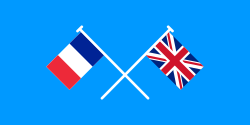New Hebrides
New Hebrides, officially the New Hebrides Condominium (French: [Condominium des Nouvelles-Hébrides] Error: {{Lang}}: text has italic markup (help), lit. "Condominium of the New Hebrides") and named for the Hebrides Scottish archipelago, was the colonial name for the island group in the South Pacific Ocean that is now Vanuatu.[1] In 1980, New Hebrides gained its independence and later became known as the Republic of Vanuatu.
New Hebrides Condominium Condominium des Nouvelles-Hébrides | |||||||||
|---|---|---|---|---|---|---|---|---|---|
| 1906–1980 | |||||||||
 | |||||||||
| Capital | Port Vila | ||||||||
| Common languages | English, French, Bislama | ||||||||
| Government | |||||||||
| Resident Commisoner | |||||||||
| History | |||||||||
• | 20 October 1906 | ||||||||
• | 30 July 1980 | ||||||||
| Currency | New Hebrides franc, Australian dollar | ||||||||
| |||||||||
New Hebrides Media
God Save The Queen (Band of the Grenadier Guards, 1952 instrumental)
La Marseillaise Rouget de Lisle Musique de la Garde Républicaine
Photograph showing the members of the New Hebrides Joint Court in 1914. Seated left, the French judge, right, the British judge, center, the President of the court, by convention a judge from the Spanish judiciary (Count de Buena Esperanza in 1914) chosen by the king of Spain. Taken from the bi-monthly La Dépêche Coloniale, Paris, 28 February 1914.
References
- ↑ Blais, Hélène (2019). "Sharing Colonial Sovereignty? The Anglo-French Experience of the New Hebrides Condominium, 1880s–1930s". In Fichter, James R. (ed.). British and French Colonialism in Africa, Asia and the Middle East. British and French Colonialism in Africa, Asia and the Middle East: Connected Empires across the Eighteenth to the Twentieth Centuries. Cambridge Imperial and Post-Colonial Studies Series. Springer International Publishing. pp. 225–247. doi:10.1007/978-3-319-97964-9_10. ISBN 9783319979649. S2CID 201397581.


